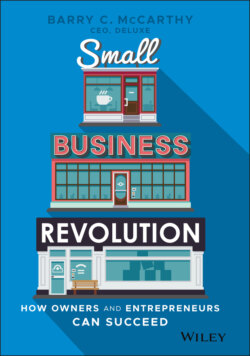Читать книгу Small Business Revolution - Barry C. McCarthy - Страница 22
Course Corrections
ОглавлениеDon't get me wrong: I'm the last person to want to put a damper on people starting businesses. Those brave people are a major target market for Deluxe. But what I am suggesting is that running a business is a bit like flying a plane. If you ever look at the route that commercial pilots take when crossing the country, you will see that it is never a straight line from takeoff to landing. They're continually making course adjustments as instructed by air traffic controllers, in order to avoid other planes and skirt around bad weather.
As a business owner, you also need to get your bearings on a regular basis and analyze where you are, where you're going, and what it will take to get there. In the SBR series, we saw many times where the current course would not allow the owners—no matter how hard they worked—to make ends meet and keep the doors open, never mind pay themselves a modest sum.
Therefore, to reach the destination of staying open and paying themselves, often the SBR businesses would have to raise prices or think of ways to trim inventory, menu items, or services offered, and other creative solutions.
Much of this book is a guide to helping you through the process of asking important questions and giving you options: it's thinking about these questions that allows you to get your bearings as a business. They involve where you are financially, what your products and services are, and how you stack up to your competition, among many other considerations.
In the course of filming many seasons of SBR, the Deluxe team has conducted literally hundreds of interviews with small businesses, and our team talks to millions of small businesses every month. We have never come across a business where the owner said: “I started the business because I was a business-school graduate and I wanted to put into practice the ideas I learned in the classroom.”
We think business schools are great and they can teach many valuable skills. I had the good fortune to graduate from one of the country's top business schools—Northwestern University's Kellogg Graduate School of Management. I am profoundly grateful for the privilege to learn at Kellogg, and for all the tools added to my kit. But having a world-class toolkit alone did not inspire me to start a business. People start businesses about something they care about, something where they can answer “why.”
The “why” almost universally is, at least in large part, about earning a living.
Behind the scenes at SBR: we met Jonas Janek in Season 3. Jonas and his business didn't make it on to the show, but he left a lasting impression as a small business owner who thought through these questions. Jonas and his wife, Andrea, live in Alton, Illinois, a bedroom community of St. Louis. They both enjoyed productive careers in big business for many years, but Jonas wanted to do his own thing. He wanted to open a business to do custom, high-end metal fabrication for any number of projects in the area.
A business executive, Jonas asked all the right questions. Yes, there was a market for what he wanted to do in a large urban area. Could he deliver products and services profitably? Yes, indeed he could. And how long before profitability? He worked all that out as well. Jonas was methodical and exacting. He bought the equipment he needed and hired skilled workers. Even through the pandemic, Jensen Fabrication thrived, and a lot of that had to do with the right questions Jonas asked and answered.
We have many medium and large businesses as customers of Deluxe. In fact, if you just focus on financial institutions, we have more than 4,000 of them as customers. Many small businesses are customers of our financial institution customers. This makes our customers' customer our customer too. That's why we love small businesses—it's where the proverbial rubber meets the road in America.
As a small-business owner, you are continually faced with the challenge of navigating the unknown:
Can I afford to hire another person?
How do I get more customers in the door without spending a ton of money (which I don't have) on advertising?
How can I possibly compete with the mega corporations that have moved into my territory?
And many more.
Your ability to pivot when new circumstances present themselves is as crucial as whatever skill you bring to the table with the products and services you offer.
